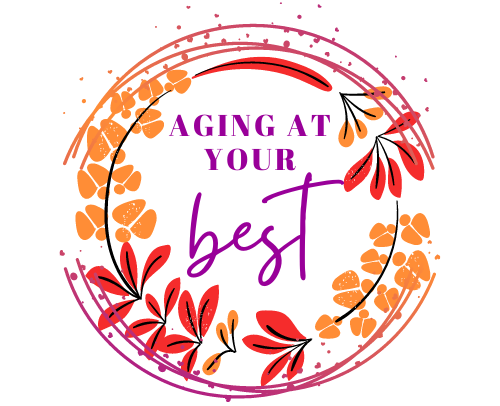Did you know that there are 34 menopause symptoms? That number really took me by surprise.
I mean I knew about the common menopause symptoms–such as hot flashes. But headaches, weight gain and irritability? I thought I’d put all of that behind me once I no longer had to worry about PMS.
However, after reading up on the 34 symptoms of menopause, I’m here to tell you that going through menopause can be like having premenstrual syndrome 24/7. That sucks, doesn’t it?
On the other hand, I’m also here to tell you that things do get better. Recently, I passed the two year mark of no longer having a menstrual period. Therefore, I’m a legit member of the menopause mob. And I couldn’t be happier.
What is menopause
It’s important to explain exactly what menopause is. It is the pause or cessation of your menstrual periods for more than one year.
However, menopause is preceeded by it’s really fun cousin (sarcasm) called perimenopause. While menopause has that one year cut off–no periods for 12 months, you’re considered to be post menopausal–perimenopause sticks to no such schedule.
In fact, I got my first menopausal symptoms when I was 37. It wasn’t until I was 55 that I’d gone a full year without getting my period.
Anyway, given all of this, I spent 18 years dealing with menopausal symptoms during perimenopause. That’s no fun.
What are the 34 symptoms of menopause
Before I get into these 34 menopause symptoms, I have a confession to make. I realize that some of the symptoms I’m about to list could be combined.
However, in all of the literature I studied before writing this article, doctors and other medical practitioners had separated the symptoms out. So, I’ve kept them on their own so that the list is accurate for these 34 symptoms.
In addition, it’s important to explain that while the following are what I’m calling the 34 symptoms of menopause, chances are you’re going to experience many of them before you’re technically menopausal. If you’re like me, then you’ll have much of this happen during perimenopause, however long that lasts for you.
Estrogen’s connection to menopause
Finally, you’re going to hear me say time and time again this about menopause: it’s all estrogen’s fault. That is as our estrogen levels fall as we approach menopause, that’s often the most obvious trigger for one of these many symptoms. Damn, estrogen.
List of 34 menopause symptoms
Anyway, onto the list of the 34 symptoms of menopause and perimenopause. They’re listed here in alphabetical order.
Allergies that are new to you
I was surprised to hear that new allergies was one of the 34 menopause symptoms. Because in my experience, the closer I got to menopause, the better my allergies became.
For example, in my 30s I was so allergic to grass that I never could mow the lawn. I wanted to be able to mow to help around the yard, but I was always so miserable afterwards. Then, in my 40s, I realized one day that I neither needed Zyrtec before mowing nor was I crazy sneezing after mowing.
One study from the National Institutes of Health connected estrogen and progesterone to the onset of autoimmune allergies. To be fair, in some women these new allergies may have also happened earlier in life, such as when they were pregnant. However, it’s definitely something that women could experience as they approach menopause.
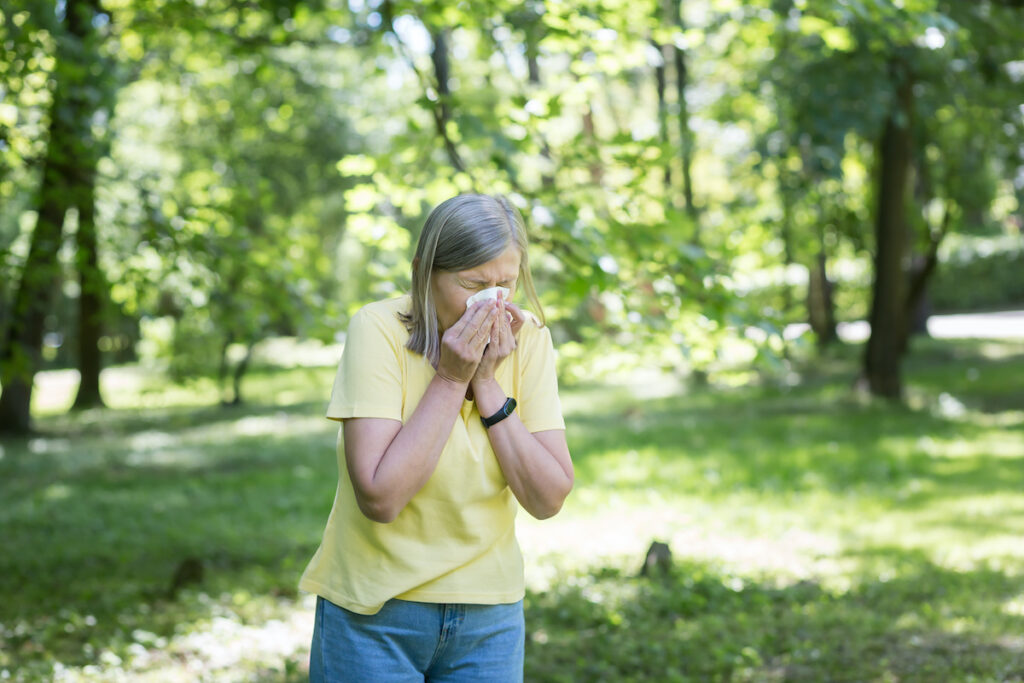
Anxiety is one of the 34 menopause symptoms
There are a number of reasons women may experience increased anxiety in and around menopause. One, thanks to hot flashes, they may find their heart rate increases. This elevated heart rate could inspire feelings of fight or flight.
Two, cortisol levels tend to rise in menopause. If you didn’t know, cortisol is the stress hormone. So increased feelings of stress could lead to feelings of anxiety.
Finally, many women have an onset of depression. Sometimes depression and anxiety go hand in hand. I can tell you that in my second full year of menopause, my depression increased as did my anxiety. Eventually, I needed to add a second antidepressant to the medication I was already taking. Also, I started seeing a cognitive behavioral therapist. Both helped.
Belly fat accumulation in menopause
For me the accumulation of more belly fat was something that happened slowly over time. Then, one day, my size 34 bras were feeling suddenly tight. None of my other clothes were fitting particularly tightly. However, wearing my normal-sized bras suddenly felt like wearing a corset.
So, I went up to a size 36 bra, which made things more comfortable. Then, I started noticing other ways that my belly suddenly seemed bigger.
Keep in mind that I’ve always had an hourglass shaped. And if you looked at me from the front, I still did. However, if you looked at me from the size, it appeared like I had a small pillow strapped to my front. Not quite a postpartum size bulge but a bulge nonetheless.
Why women accumulate belly fat as a symptom of menopause
According to Stacy T. Sims, writing in her book Next Level: Your Guide to Kicking Ass, Feeling Great, and Crushing Goals Through Menopause and Beyond, “Changes in estrogen and stress hormones send fat to our abdominal area.” Again, it’s estrogen’s fault.
Even the Mayo Clinic concurs:
“Many women also notice an increase in belly fat as they get older — even if they aren’t gaining weight. This is likely due to a decreasing level of estrogen, which appears to influence where fat is distributed in the body.”
The Mayo Clinic
Combating belly fat in menopause
So what can you do? Sims says that HIIT (high intensity interval training) exercise is a great way to build muscle and lose fat. She explains that for some reason this exercise, which alterations bursts of hard work with short periods of recovery, targets belly fat.
One study in her book Next Level revealed post-menopausal HIIT participants lost 8 percent of their abdominal fat after 16 weeks or four months. Keep in mind that HIIT workouts, because they’re so intense, are often shorter.
In fact, Sims recommends 20 minutes of HIIT workouts just three times a week to modify belly fat. It’s one of the reasons I’ve started doing more interval classes (HIIT and Tabata) on my Peloton bike.
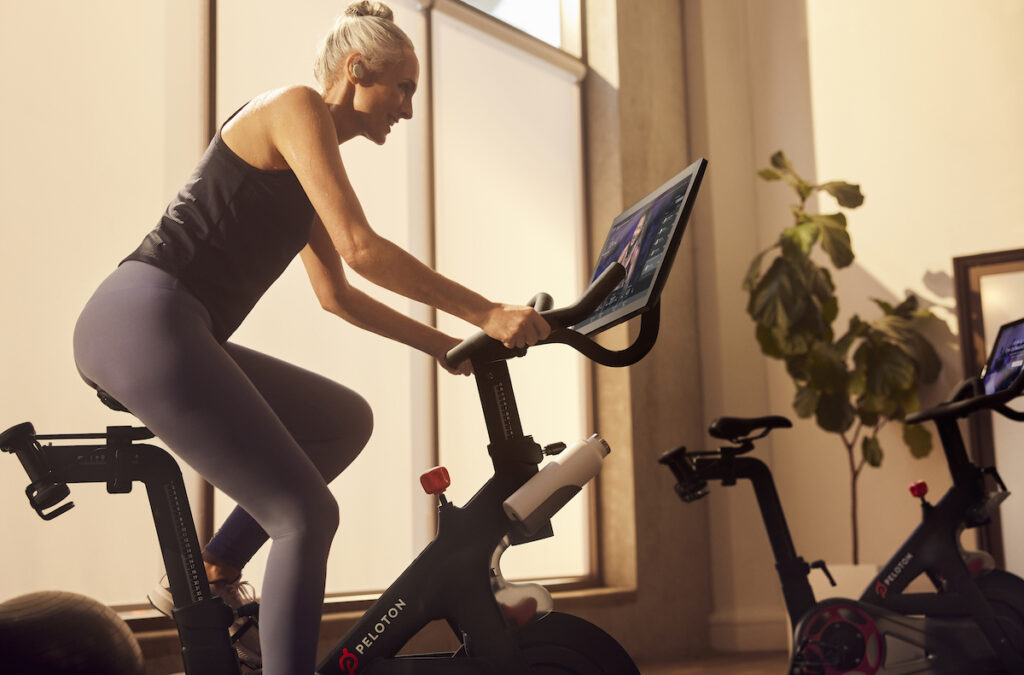
Bone density changes (osteoporosis)
There are two reasons that women may have bone density changes or become more susceptible to osteoporosis in menopause. One, we all start to lose muscle mass as we age, unless we’re actively weight training or doing weight-bearing exercise. Both of these keep our bones strong.
And, two, bone health and estrogen are inherently linked. Once estrogen starts to decrease, so can bone health, as this article from the National Library of Medicine explains. This is yet another reason to remain active as we age. It’s why I’ve started lifting weights more.
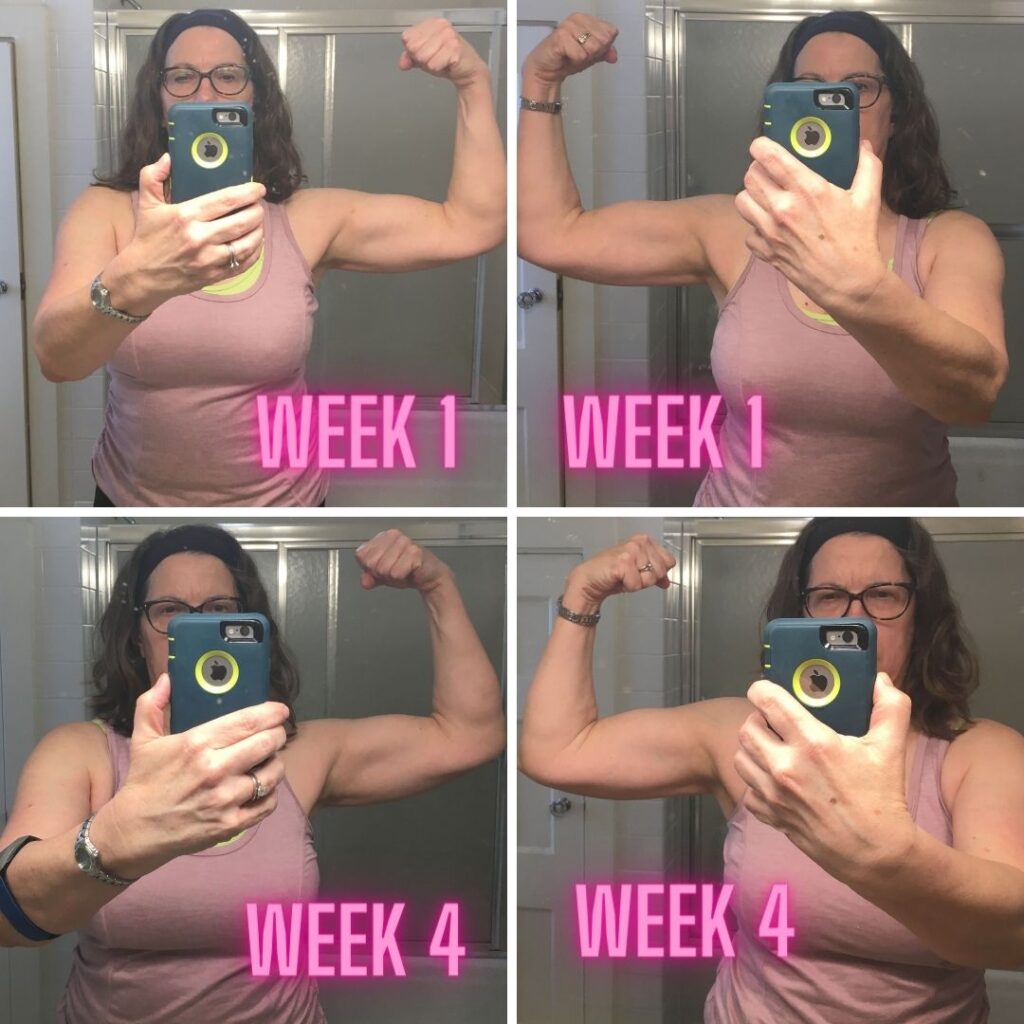
Bloating is one of the 34 menopause symptoms
Some women may have the symptoms of bloating in menopause. Others just might feel bloated but really aren’t.
This could be because of the additional belly fat they may now have–which makes them appear bloated, even though they aren’t. Or, it could be changes in your digestion due to, you guessed it, a change in hormones.
Brain fog and menopause
You may associate brain fog or forgetfulness with long COVID or even new motherhood, if you ever gave birth. However, brain fog is a real symptom of menopause, too.
On the one hand, it’s not a primary symptom, per se. This is one of those menopause symptoms where estrogen is off the hook.
On the other hand, it is the result of many of the 34 estrogen-induced menopause symptoms. This includes interrupted sleep, hot flashes and stress, so says this article from Harvard Medical School.
When you’re tired and stressed, you literally can’t think straight. So if you can get those other symptoms under control, it should help brain fog clear up.
Breast size increase in menopause
Along with increased belly fat, you may notice that this extra fat creeps upwards, too. In other words, your breasts might get bigger.
For a well-endowed girl with enough breast tissue to begin with, this is not a welcomed side effect of menopause. However, for my smaller cup sister, they may enjoy this one of the 34 menopause symptoms.
This article can help you find bras for bigger boobs.
Breast tenderness
Who knew that menopause would be just like PMS? Yup, those hormonal changes that made your breast sensitive before your period may be making them tender all over again as you go through menopause.
Cardiac irregularities as a symptom of menopause
I found that a racing heart often goes hand-in-hand with a hot flash. So you may start experiencing some cardiac irregularities, such as heart palpitations. In most cases these are harmless.
However, if you are at all concerned about your heart, please see your doctor. And if you think you might be having a heart attack, please call an ambulance.
Cravings in menopause
Like brain fog, food cravings may be a side effect of stress or sleep deprivation. However, your fluctuation hormones may be causing cravings, too. Also, you may discover that where you once craved sweet, now you crave salty and savory, or vice versa.
These are all normal symptoms of menopause. Plus, in my opinion, a little snacking isn’t the end of the world. I’m of the belief that life is too short not to have a little chocolate (albeit dark chocolate) everyday.
Depression in menopause
As I mentioned before the symptoms of menopause set in, I was already being treated for depression. However, once my periods stopped, my depression and anxiety got worse.
According to Johns Hopkins Medicine, any hormonal fluctuation in a woman’s life–puberty, pregnancy or menopause– could make her susceptible to depression. Gee, thanks hormones. Anyway, if you’re concerned, please reach out to your medical team for help.
Finally, some women find that certain antidepressants can help with hot flashes, one of the most common of the 34 symptoms of menopause. If you’re not currently taking them and are looking for relief, this might be a topic to bring up with your doctor.
Dizziness
Hello, again, estrogen. With your estrogen levels not what they used to be, your body may have a hard time maintaining your blood sugar. And when your blood sugar plummets, you can get dizzy when standing up. So, to help regular blood sugar, be sure to eat regularly and stay hydrated.
Episodes of panic
Feelings of panic go hand in hand with anxiety as one of the common symptoms of menopause.
Fatigue
Just as interrupted and poor sleep cause brain fog, so too do they lead to fatigue. I mean, if you’re not sleeping enough, you’re tired. All. The. Time.
Feelings of pins and needles
Have you ever had a rush of adrenaline while driving and your hands start to tingle as you realize you’ve just averted a crash or something else dangerous? For some women, that feeling of tingling is a symptom of menopause.
And it’s not exclusive to your hands. Any of your extremities may feel pins and needles.
For me it’s my feet and toes. Sure, my toes go to sleep if I spend too much time on my Peloton but sometimes I’ll just be sitting around and realize that my feet are “asleep.” It passes quickly, and is simply an annoyance, not painful or dangerous.
Food sensitivity onset
Just as your seasonal allergies may increase or decrease in menopause, it’s the same with food sensititivities or allergies. Suddenly, you may find yourself unable to tolerate food that previously was no problem for you to eat. Again, thank you hormones.
If you think this is a bona fide allergy, such as your throat or mouth start to tingle when eating it, stop immediately and call your doctor. You may be having an allergic reaction. Then, allergy testing is likely called for. Otherwise, you should just avoid that food from now on.
Headaches
One of the joys of not getting my period for months on end in perimenopause was no PMS. And PMS for me was always migraine headaches.
Unfortunately, once I got full-on into menopause, my headaches came back. I blame estrogen for abandoning me. However, since then I’ve figured out a way to treat the headaches and I’ve just accepted them as part of my life.
Hot flashes are the most common of 34 menopause symptoms
Hot flashes are probably the number one symptom that people associate with menopause. Why do women get hot flashes? Because with the changes in hormone levels, the body is unable to regulate its temperature like it once could.
It was a real shock for me. Pre-menopause I was always the cold person. I always had a sweater with me everywhere. Now I’m the person who’s always sweating, because I run hot now.
What triggers hot flashes in menopause
I’ve discovered two big triggers for hot flashes. One, being upset. And two, alcohol. So I try to manage my stress better to avoid getting upset, and I try to avoid drinking wine regularly to avoid hot flashes.
That doesn’t mean I live a dry life. However, when my hot flashes were at their worst, I simply would not drink alcohol to avoid feeling even worse than I already did.
Insomnia
The biggest cause of insomnia in menopause? Those darned hot flashes, which, when they happen at night, are called night sweats. If you can mitigate the sweats, you’ll sleep better.
Irregular periods are a symptom of menopause
Menopause is defined as going 12 months without a period. So, in the months and years leading up to menopause–called perimenopause–expect your periods to become irregular. Or, if they’ve always been irregular, they may become more regular. So then that’s irregular to you.
Just keep in mind that until you go 12 months without a period, you still haven’t passed through to post-menopausal land. For a couple of years I’d get to 10 months with no period and then, bam, I’d get it. So irritating!
Irritability
You know when I’m the most irritable? When I’m tired. And since we’ve established that insomnia is one of the 34 symptoms of menopause, you shouldn’t be surprised that irritability is on the list, too.
Also, irritability can be a symptom of depression. So, if you’re concerned, speak with your doctor.
Itchiness
Estrogen helps with lubrication everywhere, including your skin. So, when estrogen dries up, so does your skin. Thus, itchiness.
Joint pain
Ah, arthritis, you really rear your ugly head in the run up to menopause. Also, the overall inflammation you may be experiencing could be causing joint pain, too.
Memory lapses
As one of the 34 symptoms of menopause, memory lapses are pretty much synonymous with brain fog. You’re tired, you’re stressed and you’re forgetting things. Completely normal. And it too will pass.
Mood swings in menopause
Depression, fatigue, irritability and all of the other delicious (sarcasm) symptoms of menopause can be contributing to your mood swings.
Nails become more brittle
Just as your hair may thin in menopause, your nails may, too. Thus, they become more brittle.
Night sweats in menopause
As I mentioned in the introduction to this article, while night sweats are, indeed, hot flashes, not all hot flashes happen at night. Therefore, hot flashes have their own listing in this 34 symptoms of menopause.
So, what can you do when you’re dealing with night sweats? Here’s what got me through them and continue to help, since I still run hot.
- Take a shower before bed. Going to be with wet hair helps.
- If you have longer hair, put it up in a bun.
- Sleep in a sleeveless top or nightgown. For some reason when my shoulders are covered, I’m hotter.
- Lower the temperature in your bedroom.
- Sleep with fewer blankets.
- Get a portable fan for your side of the bed to keep your cool throughout the night. This one from Vornado is a keeper.
This article about why am I hot at night explains more about this topic.
Reduced libido
With diminished estrogen comes so many things, including a reduced libido. This could be because your vagina is now dry and sex hurts. Or, if you’re dealing with depression, it could be tamping down your libido, too.
A good place to start is talking with your gynecologist. In fact, you may want to switch to a gynecologist that specializes in midlife women. Simple changes like starting to use an estrogen cream (which has not been shown to increase cancer risk) could be all you need to get your libido back.
Sore muscles
Why do you have sore muscles all the time? According to Next Level author Stacy T. Sims, in menopause you may be experiencing increased inflammation all over your body. This inflammation can lead to muscle soreness
The best antidote? Stretching after you exercise. Also, if you’ve never tried foam rolling, now is a good time. Finally, if you can tolerate an anti-inflammatory OTC and there’s no medical reason to avoid it, take it as needed.
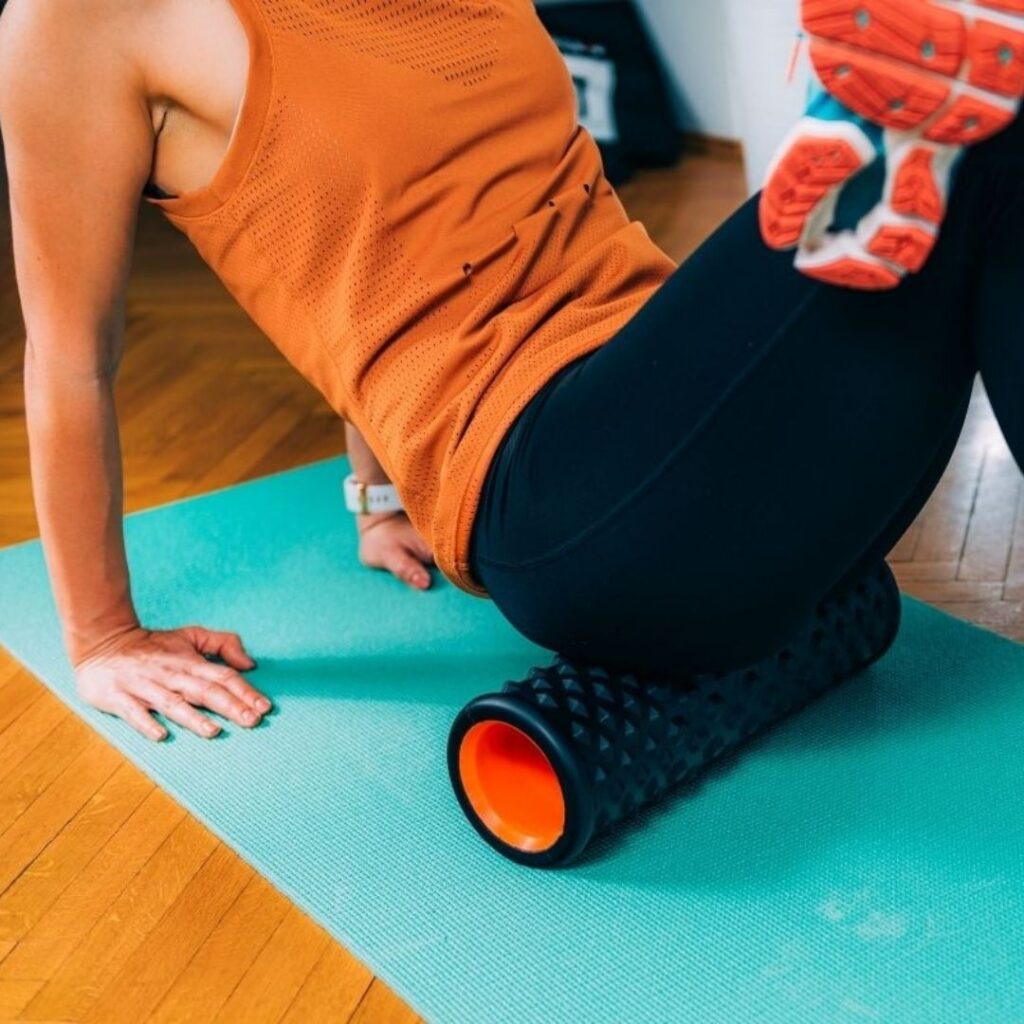
Taste buds changing
The more things change, the more they stay the same in menopause, am I right? So the reasons your taste buds might be changing? You got it–hormone fluctuations.
Thinning hair
When people talk about thinning hair, primarily, they think about the hair on their head. However, when it comes to thinning hair as a symptom of menopause, guess what? You may find that your hair thins in other places.
For example, hair “down there” may turn gray and thin. Additionally, you may discover that you no longer need to shave or wax your legs as often. That’s a good thing, right?
Urinary incontinence
Believe it or not, one of the biggest causes of urinary incontinence in women of a certain age isn’t the bladder but the pelvic floor. That is, as your vaginal tissue changes due to a decline in estrogen, it weakens the pelvic floor. And when you have a weak pelvic floor, you can have more bladder leaks.
So, how do you stop urinary incontinence? Well, doctors have told me to drink less water and give up coffee (caffeine is a bladder irritant), but I found other solutions instead.
One, my gynecologist prescribed a vaginal cream that helped bring the tissue down there back to life. Therefore, it helped to strengthen it. Two, I went to pelvic floor therapy. Three, I started using a device called the Kegelbell. And four I began strengthening my core by taking classes on the Peloton app designed for postpartum women. All have helped tremendously.
Vaginal dryness
Again, estrogen (or lack thereof) is the culprit for vaginal dryness. Estrogen creams or even just OTC lube can help.
Weight gain
Tired, stressed out people tend to eat more. And when you eat more, you gain weight.
What also could be contributing to this menopause symptom is the addition of excess belly fat, as mentioned above.
Don’t despair. You can lose weight in menopause. It just might take a little longer than you’d like.
